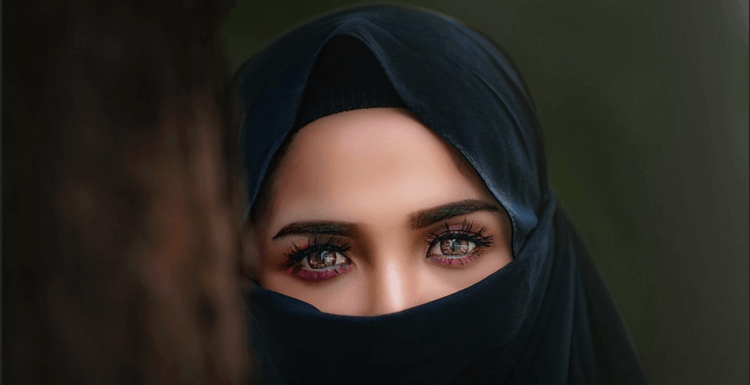


06/29/2011
I remember my first visit to the Abercrombie & Fitch store in downtown San Francisco some years back. The large stuffed leather rhinoceros just inside the doorway made the impression of entering a safari kind of place, where one could purchase proper equipment for a great adventure in the African bush. My shopping was limited to comfy Clark’s desert boots however.
Since then, the Abercrombie image has changed considerably to a more youthful look, shall we say. Advertising shows hunky young men and desirable young women, separately and together, some wearing clothes. The company encourages sales staff to wear outfits that epitomize the lifestyle it wants to sell. They are models; it’s part of the job.
Below, Abercrombie jeans.

Now a Muslim woman hired to work in the stockroom is suing the company because superiors told her to ditch the hijab (the headscarf which shows an Islamo-female’s submission to Allah and her husband or father).
Anyway, why would a properly docile Muslima want to work in a store where selling sex is part of the business plan? Did she mean finagle herself into a lawsuit situation to make some easy money? Or did she hope hasten the devolution of American via hijabification? (One thinks of the Muslim woman who sued for not being hired by a trendy London haircut salon where pink hair and assorted tattoos were the look: ”How I nearly lost my business after refusing to hire a Muslim hair stylist who wouldn’t show her hair”).

When I see a hijabbed human working in a business, my reaction is to leave. A woman in the Islam-identification uniform is voicing a rejection of women’s struggle for equality in America, which insults everyone from Susan B. Anthony to Michele Bachman. If the Muslima wants the full sharia non-equality lifestyle, then she should live somewhere among the like-minded ummah, e.g. Saudi Arabia. The United States has a different idea.
Muslim immigration has been a disastrous policy for all Americans, but women citizens who love freedom have the most to lose.
Muslim woman sues Abercrombie & Fitch over hijab, AP, June 27, 2011A former stockroom worker for Abercrombie & Fitch Co. sued the clothing retailer in federal court Monday, saying she was illegally fired after refusing to remove her Muslim headscarf while on the job.
Hani Khan said a manager at the company’s Hollister Co. store at the Hillsdale Mall in San Mateo hired her while she was wearing her hijab. The manager said it was OK to wear it as long as it was in company colors, Khan said.
Four months later, the 20-year-old says a district manager and human resources manager asked if she could remove the hijab while working, and she was suspended and then fired for refusing to do so.
It’s the latest employment discrimination charge against the company’s so-called “look policy,” which critics say means images of mostly white, young, athletic-looking people. The New Albany, Ohio-based company has said it does not tolerate discrimination.
Still, Abercrombie has been the target of numerous discrimination lawsuits, including a federal class action brought by black, Hispanic and Asian employees and job applicants that was settled for $40 million in 2004. The company admitted no wrongdoing, though it was forced to implement new programs and policies to increase diversity.
”Growing up in this country where the Bill of Rights guarantees freedom of religion, I felt let down,” Khan, now a college student studying political science, said at a news conference. “This case is about principles, the right to be able to express your religion freely and be able to work in this country.”
Abercrombie defended its record in a comment provided to The Associated Press, saying diversity in its stores “far exceeds the diversity in the population of the United States.”
”We comply with the law regarding reasonable religious accommodation, and we will continue to do so,” said Rocky Robbins, the company’s general counsel. “We are confident that when this matter is tried, a jury will find that we have fully complied with the law.”
The lawsuit filed in U.S. District Court in San Francisco comes after the Equal Employment Opportunity Commission ruled in September that Khan was fired illegally. Khan’s lawsuit was filed in conjunction with the EEOC’s lawsuit.
It is not the first time the company has been charged with discriminating against Muslim women over the wearing of a hijab.
In 2009, Samantha Elauf, who was 17 at the time, filed a federal lawsuit in Tulsa, Okla., alleging the company rejected her for a job because she was wearing a hijab. That case is still ongoing.
The EEOC filed another lawsuit for the same reason, saying the company denied work to a hijab-wearing woman who applied for a stocking position in 2008 at an Abercrombie Kids store at the Great Mall in Milpitas, Calif.
Khan’s attorney said her client is looking to get Abercrombie to change its “look policy” to allow religious headscarves to be worn by employees, and for unspecified damages. The lawsuit alleges violations of federal and state civil rights and employment laws.
”Abercrombie prides itself on requiring what it calls a natural classic American style. But there’s nothing American about discriminating against someone because of their religion,” said Araceli Martinez-Olguin, an attorney with the Legal Aid Society-Employment Law Center.
”Such a look policy cannot be squared with our shared values. No worker should have to choose between their religion and their job.”
Nobody has a right to a job, and doubly so for a job that may have been obtained through dishonesty.